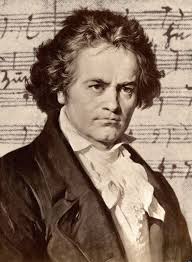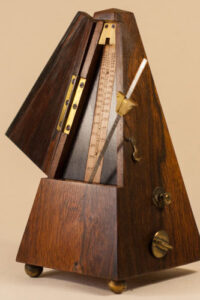
The dust spun and danced in the late afternoon sun, then settled for just a short time upon the black Steinway grand piano. I waited on one of the many hard chairs that lined Mrs. Adams living room with my sheet music on my lap, until she waved me towards the kitchen as the previous student left, and inspected my hands while I washed. Only once did I show up with dirty hands.
A week earlier, I had asked Mrs. Adams if I could learn the Moonlight Sonata. I can’t remember now where I heard it but something inside of me was unstuck and released within the haunting melody – as if I found someone who could speak my language, who knew. I loved Bach and Haydn but this! It was like finding an answer without knowing my question, and I wanted more. She gave me a little half-smile, and said nothing.
As we sat down together on the bench, she reached for a booklet of sheet music on top of the piano. “Beethoven” was in large letters across the top of the page, then “Sonata (Moonlight)” underneath. She handed it to me to look at, and probably observed the expression on my face go from delight to worry. It was almost 20 pages long.
“There’s three movements. You probably only heard the first.” And she was right. The first is the most famous – slow and rhythmic, the chords shifting and swinging in and out of darkness and light. I would discover the second movement was lighter – almost playful at times but unpredictable. The notes were played staccato, a tap dance across the keys. Then the third; it sounded like rolling thunder. My hands were about to learn how to fly! But first –
 But first, I had to learn the right hand – all 19 pages, flawlessly. No pedal, no feeling. Then the left, the bass, clunky and dull, stretching my small hand across the octaves with precise rhythm, counting out the rests and pauses to the 16th note. Finally I could put both hands together, and as the metronome swung back and forth, the sonata began to take shape. Still, this took time, synchronizing two hands to the measured language across the page. Months. Then one day, Mrs. Adams turned to me and said, “And now, with feeling!”
But first, I had to learn the right hand – all 19 pages, flawlessly. No pedal, no feeling. Then the left, the bass, clunky and dull, stretching my small hand across the octaves with precise rhythm, counting out the rests and pauses to the 16th note. Finally I could put both hands together, and as the metronome swung back and forth, the sonata began to take shape. Still, this took time, synchronizing two hands to the measured language across the page. Months. Then one day, Mrs. Adams turned to me and said, “And now, with feeling!”
This was more than just the whipped cream on the sundae – it unlocked the door into the music. And although the Italian directives like allegro (fast or brisk), crescendo (gradually louder) and pianissimo (very quiet) were dictated by Beethoven’s hand two hundred years ago, breathing life into the notes, this door also let the music become mine. I could fly with the Master, under his wing, but solo. What was his, became mine. I did not realize at the time that I was learning one of life’s most crucial lessons. Discipline first, then freedom. The lines drawn by the Creator of all things, including the metric language of all music, lay the foundation on which we build. Obedience, then blessing. Divine order.
Two years later, I stopped lessons. Mrs. Adams told my mother she had nothing more to teach me and suggested I go to Julliard in New York City. But the weak frame holding up my family was collapsing under the weight of my brother’s death a few years earlier, so instead I ran away, searching for freedom, for flight and that door in the music where my soul could escape. There were moments, fool’s gold, when I thought I had found it, but the freedom I sought entangled me in the long run. Angry, alcoholic and broken I was unable to shake loose. I was trapped.
It’s funny, but when I first met Jesus, my soul leapt. I had almost forgotten the Door but here it was! And just like that, the trap was broken and I was free. But as the thirty -odd years have passed by, I have relearned the art of discipline. Sometimes I am just playing the left hand, sometimes both, not because I love to or it feels purpose-driven. I just do the next thing, because it’s right and in the going I am learning how much I really don’t know, and His patience becomes mine. Then, usually when I’m not expecting it, God shows up in His glory, and breathes upon it and I can hear the melody.
Shortly after burying my son, I came across this:
“Grace rooteth not out the affections of a mother, but putteth them on His wheel who maketh all things new, that they may be refined, therefore sorrow for a dead child is allowed to you, though by measure and ounceweights…” Samuel Rutherford
Measure and ounceweights? Refined affections? This seemed a bit harsh at first, but over the years, almost 18 since I lost my son, the necessity of discipline, even within the most unspeakable pain has proved its place. Isn’t the true essence of faith often like playing with the left hand? Prayer is hollow, Jesus is not calling, There is no melody, no place for interpretation or even appreciation. It is boring at best, terrifying at worst. There were days where I felt as if I was on a tightrope over a huge gaping abyss… in a black-out. Slow, one unsure step at a time towards a place I couldn’t see. It was exhausting, but eventually, over years, it led to a wide open place, a higher ground with a better view. There I had a new song I could not have learned any other way. No short-cuts – I looked.
Western Christianity often looks like whipped cream on whipped cream. Church websites lure the flock (often Christians from other churches) with pictures of lattes, videos of pretty girls in dark theaters with neon lights, eyes closed, arms raised, swaying to the music. Or bands on huge stages where they have enough room to skip and dance.Now that’s important. So when the lights are turned on and everyone goes home, will you have something to take with you, to practice? Something that God himself picked for you to learn. Or will it seem too hard?
“No discipline seems pleasant at the time, but painful. Later on, however, it produces a harvest of righteousness and peace for those who have been trained by it. ” Hebrews 12:11
or try this:
“Whoever loves discipline loves knowledge, but whoever hates correction is stupid.” Proverbs 12:1
Disciple means discipline. It should not be easy. It is not skipping across a stage.
We need to fly – I do. Those precious times when God has brought me under His wing and into His sanctuary, the place of refreshing, of vision and hope – every believer needs that. But it is not our entitlement. We are His own, bought with a heavy cost. Our rights, our affections, our dreams are handed over to Him to place on the wheel. And when He is looking around for someone to use, he will need “a vessel for honor, sanctified and useful for the Master, prepared for every good work.” 2 Timothy 2:21
One day, every follower of Christ will get called home. And I think it will be a little like when Mrs. Adams said, “And now, with feeling!” Because then it will become ours, even though God made the whole thing. And we will have the answer to the yearning that haunts every human heart, and all the discipline, the refining by ounces and measure, the turning on the potter’s wheel will become radiant glory, His eternal song will be ours as we worship at His throne. If I see Beethoven there, I’d like to thank him for pointing a little girl towards something deeper, something that only Christ could complete. But until that day, first the right hand. Perfect! Now the left…
PS Here it is. Yes I could play this when I was 11. But definitely not now!
